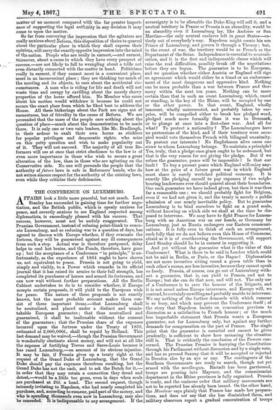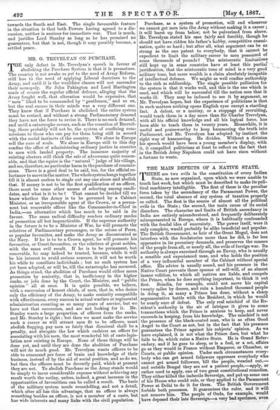THE CONFERENCE ON LUXEMBURG. A FFAIRS look a little more peaceful,
but not much. Lord Stanley has succeeded in gaining time for further nego- tiation, and the British public, which is openly anxious for peace, and covertly anxious to see England respected among diplomatists, is exceedingly pleased with his success. That success, however, must not be unduly exaggerated. The Prussian Government, instead of refusing point-blank to evacu- ate Luxemburg, and so reducing war to a question of days, has agreed to discuss with Europe whether, if they evacuate the fortress, they will be guaranteed against any ill consequences from such a step. Actual war is therefore postponed, delay helps to cool hot brains, and the Funds, therefore, have gone up ; but the acceptance of a Conference " in principle," is un- fortunately, as the experience of 1864 ought to have shown us, not equivalent to peace. Prussia is not going to yield, simply and visibly, to a Power which remarks in its official journal that it has raised its armies to their full strength, has completed its purchases of horses and armed its fortresses, and can now wait without further preparations. All the Berlin Cabinet undertakes to do is to consider whether, if Europe accepts certain proposals, it will yield to the European wish for peace. The nature of these proposals is not exactly known, but the most probable account makes them con- sist of three important items,—that Luxemburg shall be neutralized, and placed under a distinct and unmis- takable European guarantee ; that thus neutralized and guaranteed, it shall be inalienable without the consent of the guarantors ; that the Prussian share of the expenses incurred upon the fortress under the Treaty of 1839, estimated at 2,000,0001., shall be repaid by Holland. This last demand may be waived,—though the Prussian Government is wonderfully obstinate about money, and will not at all like the expense of fortifying Treves and Sarre-Louis because it has razed Luxemburg,—on account of its obvious injustice. It may be fair, if Prussia gives up a treaty right at the request of the Grand Duke of Luxemburg, that the Grand Duke should pay the expenses therefrom resulting, but the Grand Duke has not the cash, and to ask the Dutch for it,— in order that they may retain a connection they dread and detest,—would be a little too gross, even in days when souls are purchased at 201. a head. The second request, though intensely irritating to Napoleon, who had nearly completed his purchase, and, according to rumour, paid part of the money, and who is spending thousands even now in Luxemburg, may also be conceded. It is indispensable to any arrangement. If the sovereignty is to be alienable the Duke-King will sell it, and a neutral territory in France or Prussia is an absurdity, would be an absurdity even if Luxemburg lay, like Andorre or San Martino—the only neutral enclaves left in great States—en- tirely out of everybody's way. Napoleon might create his son Prince of Luxemburg, and govern it through a Viceroy ; but, in the event of war, the territory would be as French as the Department of the Seine. Independence is essential to neutrali- zation, and it is the first and indispensable clause which will raise the real difficulties, possibly break off the negotiations before they are begun. The guarantee is to be European, and we question whether either Austria or England will sign an agreement which would either be a fraud or an embarrass- ment of the most dangerous and oppressive kind. Nothing can be more probable than a war between France and Ger- many within the next ten years. Nothing can be more certain than that in such an event Luxemburg, which, razed or standing, is the key of the Rhine, will be occupied by one or the other power. In that event, England, wholly innocent, wholly uninterested, and probably taken by sur- prise, will be compelled either to break her pledged word, pledged • much more formally than it was to Denmark, or to plunge at once into a first-class war. And all for what? To protect a nationality ? The Luxemburgers have no pretensions of the kind, and if their territory were occu- pied would vote themselves French with bilingual unanimity. To protect our interests ? No Englishman alive cares one straw to whom Luxemburg belongs. To maintain a principle? Yes, truly, that a pledge once given ought to be redeemed, but that is the very reason for not giving the pledge. But if we refuse the guarantee, peace will be impossible ? Is that our fault ? To buy a present peace which England will enjoy any- how at the price of a future great war in which England must share is surely wretched political economy. It is exactly like pledging oneself to pay expenses if two neigh- bouring landowners ever should quarrel about their boundaries. One such guarantee we have indeed given, but then it was thus far a reasonable one ; we -should probably fight for Belgium, even if we had not given it, and the treaty is merely a public admission of our nearly inevitable policy. But to guarantee Luxemburg is to bind ourselves to fight on a grand scale, without knowing on which side we shall at the time be dis- posed to intervene. We may have to fight France for Luxem- burg with an American war on our hands, or Germany for Luxemburg, just as Russia endangers our Eastern communi- cations. It is folly even to think of such an arrangement, such folly that we do not believe even this House of Commons, afraid as it is of overthrowing the Government, will support Lord Stanley should he be in earnest in suggesting it.
And yet without the guarantee what is the value of this Conference? What is there to be said in London which could not be said in Berlin, or Paris, or the Hague? Diplomatists are not more inventive sitting round a green table- than in each other's rooms, are less inventive, because they cannot speak so freely. Prussia, of course, can go out of Luxemburg with- out a guarantee, that is, can yield to France, and not to Europe ; but she can do that now, and will not. The only use of a Conference is to save the honour of the litigants, and it is not saved unless Europe intervenes, and Europe will, we contend, be certainly unwillingand probably unable to intervene. We say nothing of the further demands with which rumour is so busy, and which may prevent the Conference itself ; of the story that Napoleon insists on evacuation previous to discussion as a satisfaction to French honour ; or the much less improbable statement that Prussia wants a European guarantee, not for Luxemburg only, but against any further demands for compensation on the part of France. The single point that the guarantee is essential and cannot be given prudently, is sufficient to show how menacing the situation still is. That is evidently the conclusion of the Powers con- cerned. The Prussian Premier is hurrying the Constitution through his Parliament without discussion and by a single vote, and has so pressed Saxony that it will be accepted or rejected in Dresden also by an aye or nay. The contingents of the Southern Governments are ready to march, though not yet armed with the needle-gun. Rastadt has been garrisoned, troops are pouring into Mayence, and the commissariat department in the Rhine provinces is fully organized. Prussia is ready, and the ominous order that military movements are not to be reported has already been issued. On the other hand, the Manamur says plainly that France has made her prepara- tions, and does not say that she has diminished them, and military observers report a gradual concentration of troops towards the South and East. The single favourable feature in the situation is that both Powers having agreed to a dis- cussion, neither is anxious for immediate war. That is much, and justifies Lord Stanley as long as he has promised no guarantees, but that is not, though it may possibly become, a settled peace.































 Previous page
Previous page